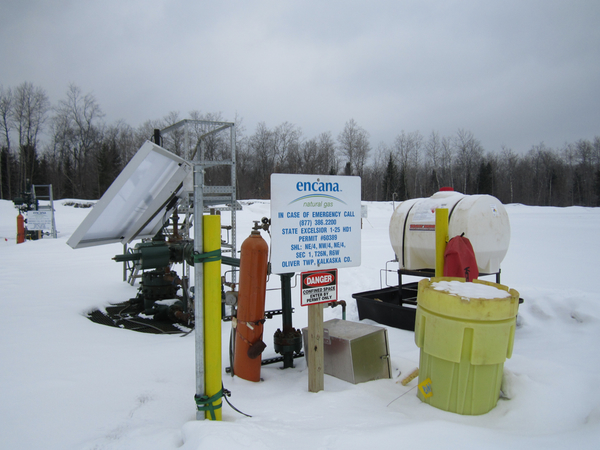A divisive practice's pros and cons
Hydraulic fracturing, or fracking, is an innovative and cost-saving process for drilling oil and gas from rock formations far underground, and is a booming industry in Michigan. Proponents say fracking is safe and note its positive impact on the state economy. Critics say the process carries risks, both known and unknown, to Michigan’s water supply and public health and should be more closely monitored by regulatory agencies.
Pros
- There are enough fossil fuels “locked” in bedrock shale formations under North American soil to make the United States energy independent, and a net exporter of oil and gas, in the near future.
- Tapping those energy sources would make the United States less dependent, economically and politically, on unstable countries such as Venezuela and the Middle East. It would also enable the West to be less dependent on Russian natural gas, which Vladimir Putin currently uses as a political lever.
- The natural gas industry claims that fracking is safe because the shale formations lie far below the water table and pose a minimal threat to groundwater. They also claim that drilling for oil and gas is nothing new: we’ve been drilling for oil and gas for decades.
- Using natural gas to heat our homes and power our cars releases far fewer carbon emissions than coal. Proponents describe the growing natural gas industry as an environmentally pragmatic “bridge fuel” that will buy time until we can harness the power of wind, solar and hydro on a mass scale.
- In places like Kalkaska County, the oil and gas industry is big business, providing hundreds of jobs. Many of those contractor and subcontractor jobs are tied to fracking.
Cons
- Because fracking involves pumping a concoction of water, sand and chemicals into the ground to break apart the bedrock, environmentalists and private landowners worry that those chemicals could reach, and poison, the groundwater.
- Companies are not required to disclose the chemicals they use, or the formula of the mixture, in the process. That makes it difficult for local residents, or first responders, to prepare for an accident or emergency, and difficult for scientists to gauge the threat posed by the chemicals.
- In Michigan, as many as 35 million gallons of freshwater are removed from nearby aquifers per frack well — the highest rate in the nation. The Anglers of the Au Sable, a Michigan environmental conservation group, and others, worry that this will deplete freshwater sources and potentially dry up rivers and streams that are key to Michigan’s ecological health.
- Water for fracking is typically transported to well sites using heavy trucks, which turn pristine rural areas into industrial highways. The fracking, itself, is conducted day and night, causing both noise and light pollution for some nearby residents.
- The stakes are rising. According to environmental groups, energy company Encana’s push for the Michigan Department of Environmental Quality to allow “resource play hubs” (multiple drilling wells from the same site) could exponentially deplete the local water supply.
Disclosure: John Bebow, CEO of the Center for Michigan, of which Bridge is a part, is second vice president of the conservation group Anglers of the Au Sable. Bebow had no role in the writing or editing of this article, nor in the writing or editing of Bridge’s coverage on fracking.
Business Watch
Covering the intersection of business and policy, and informing Michigan employers and workers on the long road back from coronavirus.
- About Business Watch
- Subscribe
- Share tips and questions with Bridge Business Editor Paula Gardner
Thanks to our Business Watch sponsors.
Support Bridge's nonprofit civic journalism. Donate today.
See what new members are saying about why they donated to Bridge Michigan:
- “In order for this information to be accurate and unbiased it must be underwritten by its readers, not by special interests.” - Larry S.
- “Not many other media sources report on the topics Bridge does.” - Susan B.
- “Your journalism is outstanding and rare these days.” - Mark S.
If you want to ensure the future of nonpartisan, nonprofit Michigan journalism, please become a member today. You, too, will be asked why you donated and maybe we'll feature your quote next time!


 An Encana well on state forest land not far from the Manistee River headwaters. Encana has brought well-paying jobs, allegations of bid-rigging, and some nagging health and environmental questions to Michigan. (Bridge photo by Jacob Wheeler)
An Encana well on state forest land not far from the Manistee River headwaters. Encana has brought well-paying jobs, allegations of bid-rigging, and some nagging health and environmental questions to Michigan. (Bridge photo by Jacob Wheeler)